A correction in The New York Times on August 28, 2009, noted a number of errors in a photo caption that had accompanied the obituary of U.S. Senator Edward M. Kennedy of Massachusetts the day before. The caption, the nation’s newspaper of record acknowledged, “misidentified two of his sisters and omitted a third in some editions. In some editions, Eunice’s name was omitted, and in some editions, Rosemary and Kathleen were reversed.”
Invisible or interchangeable. That was the lot of the daughters of Joseph P. and Rose Fitzgerald Kennedy, relegated to the role of decorative accessories to the outsize ambitions, first of their father and then their brothers. Charming London society when Joe was U.S. ambassador to the Court of Saint James’s in the late 1930s. Hosting ladies’ teas during Jack’s first congressional race a decade later. Accompanying one of their brothers during the continual campaign that defined the Kennedys’ lives for more than a half century. From Jack’s ascendancy as the first Catholic president, through Bobby’s ill-fated run for the White House, to Ted’s long career in the Senate, Eunice, Pat, and Jean — the three Kennedy sisters not lost young to tragedy — were a silent backdrop to the nation’s storied political dynasty.
In the case of Eunice, that image was wildly out of focus. There was nothing silent or ornamental about the fifth of Joe and Rose Kennedy’s nine children. Even as she hatched the idea for those tea parties, Eunice chafed at such a circumscribed role in what was fast becoming the family business. “Dear Daddy, I know you are very busy,” she wrote to her father at Hyannis Port, probably in the late ’50s. “I also know you are advising everyone else in that house on their careers, so why not me?”
The answer was simple: As much as Joe Kennedy loved all of his children, his sons, not his daughters, were his priority. Born in 1921, only a year after women in the United States secured the right to vote, Eunice came of age a generation before the second wave of feminism expanded expectations and professional opportunities for women. In many ways, her struggle to be seen — on the public stage and in her own family — mirrors the experience of so many ambitious women in mid-20th-century America who had to maneuver around the rigid gender roles that defined the era.
But nowhere were those roles more deeply ingrained than in the household of Joseph P. Kennedy. Bobby Kennedy surely was not thinking of his sisters when he wrote in praise of his father: “In how many families have the young been stultified? Again and again, young men with ability and talent have been kept from taking their places in the affairs of business or on the national stage because an older figure refused to make room and insisted on the glory and attention until the very end.” When Joe Kennedy died in 1969, the subheadline above his obituary in the New York Daily News reflected the societal value accorded his five surviving children: “He Left One Son,” it read.
Eunice accepted that hierarchy at an early age. “I am sure it’s normal for girls to look up to their older brothers with some admiration and sense of dazzlement, but in our case it was fairly extreme,” she said. “To us, they were marvelous creatures, practically godlike, and we yearned to please them and be acceptable.”
Until the end of her life, Eunice would give fulsome credit to her brothers in the White House, the U.S. Justice Department, and the U.S. Senate for initiatives that had been her ideas. She would cede the spotlight to the boys, but she would use her wits, her famous name, her father’s fortune, and her brothers’ influence to make her own mark. In the process, she would advance one of the great civil rights movements, on behalf of millions of people across the world with intellectual disabilities. When she died, two weeks before her more celebrated kid brother, Ted, it was Eunice who left behind the Kennedy family’s most profound and lasting legacy.
Her vision elevated a Chicago parks program into Special Olympics, which, on its 50th anniversary, served more than 4.9 million athletes in 172 countries with more than 1 million coaches and volunteers. Her fervor transformed her family’s unfocused charitable foundation into an engine for scientific research at universities from Stanford to Wisconsin to Johns Hopkins. Her prescience led to the creation of a federal research institute devoted to maternal and child health. Her determination to empty Dickensian institutions for the mentally retarded sparked an unprecedented national commitment to community-based group homes, educational inclusion, and job training that changed the lives of millions who had been warehoused and forgotten.
Fueled by a religious conviction that every life, no matter how compromised, has value, she left her fingerprints on everything from the Mental Retardation Facilities and Community Mental Health Centers Construction Act of 1963; to the 1976 Hyde Amendment, restricting the use of federal funds for abortion; to the 1990 Americans with Disabilities Act, barring discrimination against the disabled in every area of public life.
And yet for all of her influence and impact, Eunice Kennedy Shriver lives in public perception at the fringe of her brothers’ life stories rather than at the center of her own.
Today her name is synonymous with Special Olympics, but Eunice Kennedy Shriver’s career in public service began decades before she opened the first games on a sunny July Saturday at Chicago’s Soldier Field in 1968. She worked at the U.S. State Department two years before Jack arrived on Capitol Hill in 1947. She administered a task force at the U.S. Department of Justice on juvenile delinquency 14 years before she talked Bobby into tackling that issue as attorney general in 1961. She denounced the long prison terms meted out to the nonviolent offenders she counseled at Alderson, the federal penitentiary for women in West Virginia, more than 25 years before Ted championed that same cause as chairman of the Senate Judiciary Committee in the late 1970s.
Eunice Kennedy took home only one paycheck in her life, from her first job at the U.S. State Department. She sent that check for $60 to her parents in Palm Beach, Florida, to spend “on something grand.” Thereafter, she declined the proffered annual salary of $1,800 and became a “dollar-a-year-girl,” the informal appellation for those wealthy enough to work without regular compensation. During and just after World War II, Washington was full of young women whose well-connected fathers found them interesting unpaid employment in what was expected to be a brief interval between college and marriage.
That interval lasted a decade in Eunice’s case; the interesting work lasted a lifetime. When she married in 1953, it was to the man her father chose for her, the man who would become her devoted partner in parenthood, religious faith, and social justice, the passions that fueled their marriage and their lives. In the late ’50s, while her father mapped out her brothers’ political careers, he entrusted to Eunice and Robert Sargent Shriver the resources of the family’s charitable foundation. Over the years, the letterhead would identify Jack or Bobby or Ted as president of the Joseph P. Kennedy Jr. Foundation, named for their oldest brother, killed in combat in World War II, but it was always Eunice who ran the show, turning a small family foundation into an engine of social change.
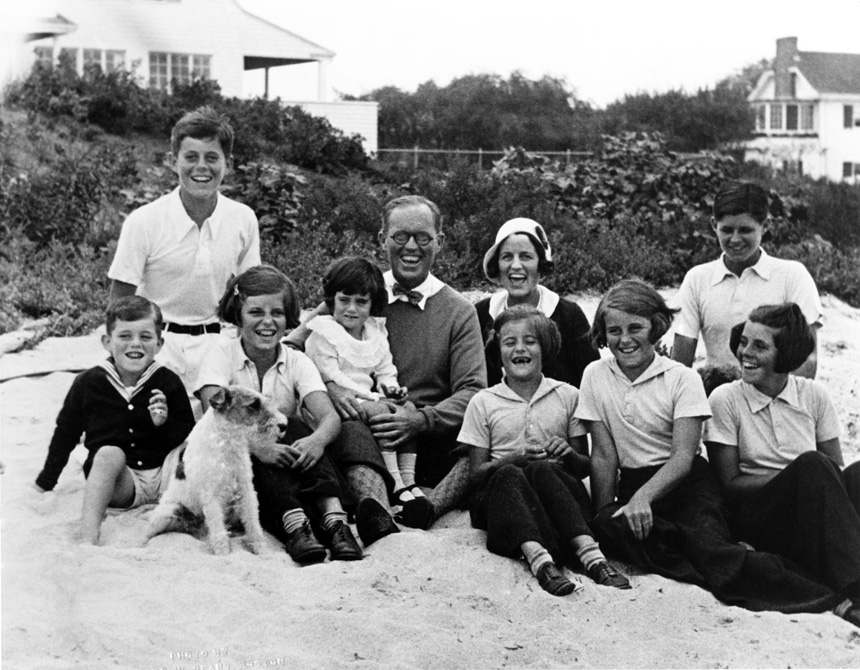
She exerted no less sway when Jack arrived in the Oval Office, goading her older brother into putting mental retardation on his agenda for the first time in his political career, pushing him to throw the weight of the U.S. government behind efforts to combat juvenile delinquency, and prodding him to create the medical research institute devoted to women and children that today bears her name.
With the same persistence, she badgered lawmakers and eight U.S. presidents after Jack, influencing public policy across four decades on issues that helped define the social upheaval of her times. In the 1960s, as the movement to decriminalize state abortion laws gained momentum, she partnered with the Harvard Divinity School to convene the first international conference on the issue. In the 1970s, even as she chastised the women’s liberation movement for devaluing motherhood, she argued for both publicly funded childcare and a welfare system that did not penalize mothers who stayed home to care for their children. In the 1980s, she lobbied for services for pregnant teenagers with the same vigor that she opposed the use of federal funds for fetal research. In the 1990s, she championed expanded educational, employment, and housing opportunities for those living with intellectual disabilities well into productive adulthoods because of medical advances spurred by her relentless advocacy on their behalf.
Eunice was in many ways the anti-Kennedy. Her work upended her father’s dictum that only first-place finishers count.
The ultimate family loyalist, Eunice was also in many ways the anti-Kennedy. Her work upended her father’s dictum that only first-place finishers count. She idolized her father, but his competitive zeal had proven disastrous for Rose Marie, the older sister the family called Rosemary, who had been lobotomized in 1941 in a botched attempt to treat the mental illness that compounded her intellectual disabilities. The surgery, initiated by Joe without his wife’s knowledge, left their 23-year-old daughter incapacitated, exiled from her family by the patriarch’s decree until Eunice brought her out of the shadows after her father’s domineering voice had been silenced by a stroke in 1961.
In reclaiming her discarded sister, Eunice was redressing not just her father’s choices but her own. How had it been so easy to acquiesce in the banishment of the sister she had taught to sail, with whom she had hiked the Alps and danced at debutante balls, to have put the inconvenient Rosie out of her mind as well as out of her sight?
Did she agree with her father, who wrote to one of the nuns caring for the institutionalized Rosemary in 1958 that “the solution of Rosemary’s problem has been a major factor in the ability of all the Kennedys to go about their life’s work and to try to do it as well as they can”? Had Rosemary been sacrificed so they could thrive?
There would be a mania in Eunice Kennedy Shriver’s efforts to expiate that familial guilt for the rest of her life; a relentlessness that could intimidate subordinates who did not share her sense of urgency, congressional staffers who failed to do her bidding, and federal bureaucrats who obstructed her path.
She was a woman both ahead of her time and out of step with it. A devout Catholic in a secular age, she was a daily communicant likelier to be carrying rosaries in her purse than a wallet. An ambivalent feminist, she embraced the cause of gender equality but rejected the idea that access to abortion was necessary to achieve it. A champion of self-discipline, she enfolded without judgment those in her family who fell victim to depression or substance abuse or eating disorders, a private struggle she was loathe to confront in herself. A communitarian at heart, she elevated the welfare of the whole above the supremacy of the self, less as a political philosophy than a reflection of her Catholic belief that everyone is part of the body of Christ.
For all of that, Eunice Kennedy Shriver was not the saint her admirers hope the Vatican will one day declare her to be. She enjoyed the entitlements of wealth too much to emulate the selflessness of the women she revered most: Mother Teresa and Dorothy Day. Meekness did not become her. Patience was not one of her virtues. She resembled more the pioneer aviator whose pictures covered her walls as a teenager. She admired Amelia Earhart, the first woman to fly solo across the Atlantic Ocean, Eunice said, for her “courage and toughness in a male world and as an explorer of the unknown.”
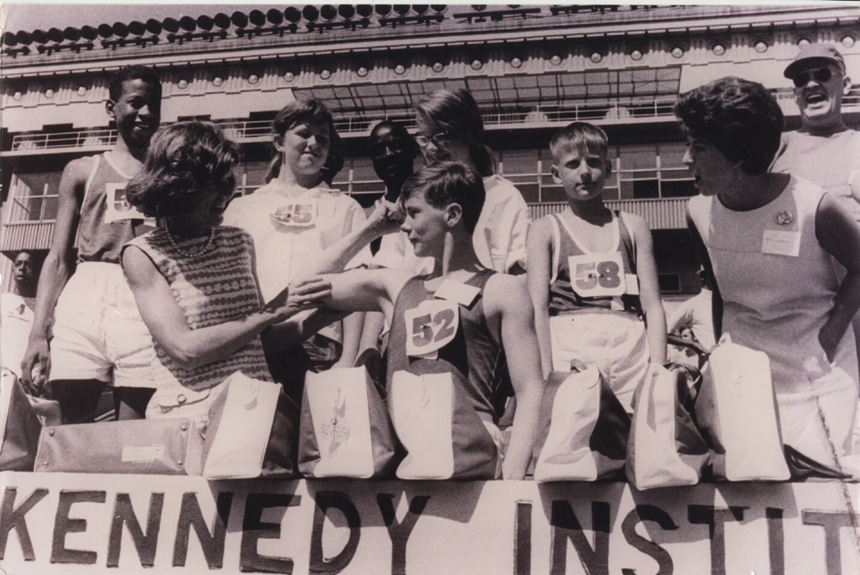
Eunice followed in her footsteps. Richard Nixon, who was a frequent guest at Jack’s and Eunice’s table in Georgetown in the late 1940s, remembered that, when the men adjourned for cigars and political talk after dinner, Eunice went with them, lighting her own stogie, refusing to be relegated to the drawing room to gossip with the women.
She was part visionary and part master tinkerer, quick to recognize a good idea and quicker still to appropriate it in the service of her cause. In Rockville, Maryland, she stunned the neighbors by operating a summer camp for retarded children on the grounds of Timberlawn, the 250-acre estate the Shrivers leased when they followed Jack to Washington in 1961. In Paris, she horrified the staff by turning the marble foyer of the ambassador’s residence into play space for mentally disabled children from nearby institutions when her husband was U.S. ambassador to France. In China, she ignored protocol to elbow her way inside institutions for disabled children to see for herself the conditions in which they lived. In Washington, she went straight to the Oval Office to chide President Bill Clinton about changes to federal welfare regulations that took hard-won benefits from those she continued to call her “special friends” long after the phrase had fallen out of favor.
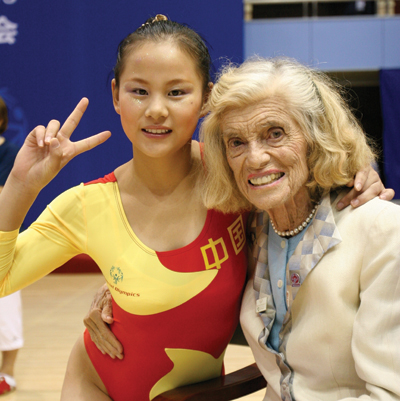
“If that girl had been born with balls, she would have been a hell of a politician,” Joe Kennedy is reputed to have said of Eunice, an observation that reflected less on her talents than on the limits of his imagination. The self-made multimillionaire could envision either of his older sons the first Catholic president but could not picture his daughter in public office — not among the seven women serving in the House when Jack arrived there in 1947 or the three women in the Senate when he entered the upper chamber in 1953. Breaking barriers was for Kennedy men, not Kennedy women. Men play and women pray; that was Joe Kennedy’s attitude toward his wife and daughters.
Perhaps the least introspective member of a clan scornful of self-reflection, Eunice wasted little energy ruminating about the second-tier status of women in her family, but it hardly escaped her notice that her father had vetoed Jean’s plan to become a doctor or a nurse and Pat’s ambition to pursue a career in business or the law. Of the sisters, only Eunice broke out of the box to which her gender consigned her, finding her way around their father to secure her place in the world and in history.
“Needless to say, after so many years of coming here to celebrate Jack and all the boys, it is nice to have an evening for one of the women,” she told an audience gathered at the John F. Kennedy Presidential Library and Museum in Boston in 2007 to honor her. Her lips were parted in a smile, but her teeth were clenched.
Instead of stewing about the double standard, she had forged her own path, competing as a young woman with her brothers in athletics. Trained by her father not to lose, she rarely did, despite a physical constitution so delicate her family called her “Puny Eunie.”
In Eunice Kennedy Shriver’s stubborn refusal to accept either her body’s own limitations or her father’s low expectations, the seeds of more than Special Olympics were sown. The same willful determination would chart her course on behalf of those denied a chair in the classroom, a place on the playing field, or a job in the workforce. She would provide them with the chance to thrive that had been denied to Rosemary, the sister whose fate, their mother wrote in her memoirs, was “the first of the tragedies that were to befall us.”
It was “all so unnecessary” and so wasteful, Eunice wrote, remembering the long hours her mother had spent working with Rosemary and “taking her to psychologists and to dozens of doctors” only to be told her situation was hopeless. The disastrous lobotomy fulfilled that bleak prophecy, convincing Eunice that doctors knew no more about the causes and treatment of mental retardation than the eugenicists who, early in the 20th century, had advocated forced sterilization as the most effective means of ridding society of those medicine variously labeled idiots, imbeciles, or morons. Her efforts built on a nascent movement led by parents struggling to keep their disabled children at home, by lawmakers fighting for funds to educate those children, by park workers developing recreational programs for them, by progressive superintendents at state institutions championing their right to be treated with dignity, and by civil rights lawyers seeking court orders to force reform on less enlightened asylum administrators.
It turned out that Joe Kennedy had been wrong about his daughter. Her sex did not disqualify her from a career in politics. No one in Congress who tried to cut an appropriation she wanted, no one in a corporate boardroom who tried to dodge a sponsorship role in Special Olympics, no acquaintance who tried to avoid volunteering at the games doubted that Eunice Kennedy Shriver was as equipped as any man to work her will and get her way.
When the men adjourned for cigars and political talk after dinner, Eunice went with them, lighting her own stogie.
For more than four decades, presidents from Lyndon B. Johnson to George W. Bush honored her. In 1984, Ronald Reagan awarded her the Presidential Medal of Freedom. In 1998, Bill and Hillary Clinton celebrated the 30th anniversary of Special Olympics with her at the White House.
Every award, whether from the Lasker Foundation for her contributions to medical research, or from the University of Notre Dame for her embodiment of Catholic principles, cited compassion as the engine that propelled her to fight for the forgotten. That she was moved by their plight is indisputable. But empathy alone did not fuel her activism. There was also rage. Rage at the impotence of a medical establishment that had no answers for her sister. Rage at the lack of respect for life in a society more focused on personal fulfillment than communal responsibility. Rage at the inability, or unwillingness, of government to deliver on America’s promise of equality for all its citizens, no matter how diminished their capacities.
Ironically, it was from the father who had underestimated her that Eunice learned how best to advance her cause. “It is not what you are, it’s what people think you are,” counseled the man who, in one generation, recast the Kennedys from Irish-American strivers into American royalty. Social acceptance, of a Catholic president or a retarded child, first required a change in public perception.
That is exactly what Eunice engineered in 1962, when she invited photographers from The Saturday Evening Post to capture images of laughing children in pony carts, on rope swings, in the swimming pool of her backyard; and in 1968, when she recruited professional athletes as their coaches; and in 1972, when she convinced Roone Arledge to televise Special Olympics on ABC’s Wide World of Sports.
“When she told me what she wanted, I thought, ‘Nobody is going to watch this, a bunch of crippled kids running around,’” Frank Gifford, the former New York Giants running back and the program’s host, recalled more than 40 years later. “We captured it all on film, and it was one of the most moving things I have ever done. It took away the despair and the fear. They were just kids, having fun. After we put it on television, we picked up crowds all over the country. No one could tell her it wouldn’t work.”
In adopting Joe Kennedy’s marketing methods, Eunice Kennedy Shriver had turned her father’s idea of competition on its head. In the process, she proved herself more than the equal of any man in the Kennedy clan.
This article is featured in the January/February 2019 issue of The Saturday Evening Post. Subscribe to the magazine for more art, inspiring stories, fiction, humor, and features from our archives.
Become a Saturday Evening Post member and enjoy unlimited access. Subscribe now
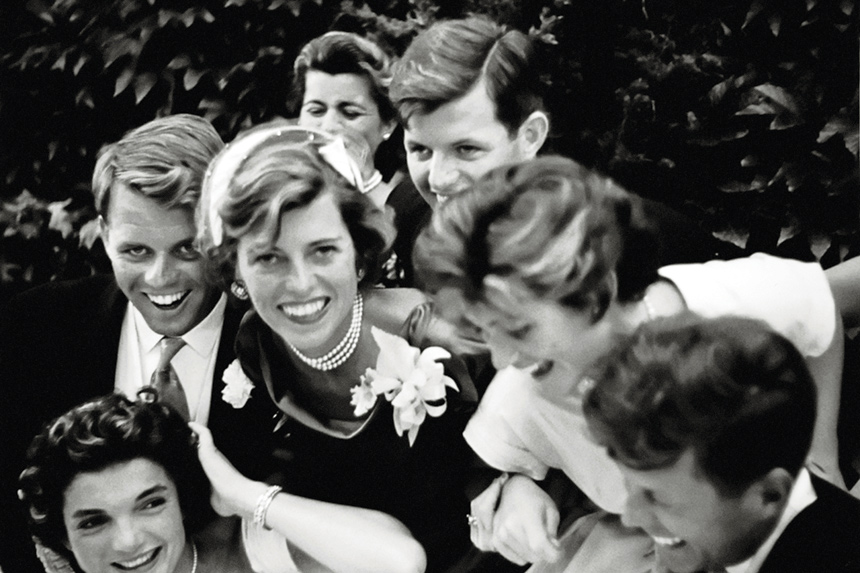
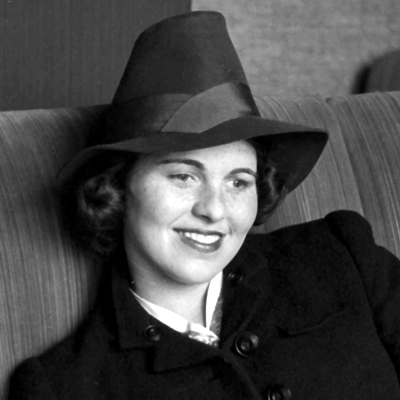

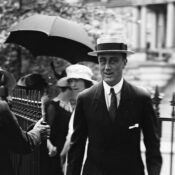

Comments
As a millennial, I find that my scope of knowledge concerning the history of the Kennedy family lies mostly only in the handful of movies I’ve seen in my lifetime in which they are biographically featured, or at least mentioned in period films. As this article mentions, the subjects of said flicks are typically JFK, his brothers, or Jackie O (I very much enjoyed “Grey Gardens”; not so much “Jackie”). But yes, the Kennedy sisters are virtually nonexistent.
So I enjoyed learning from this article about the life of Eunice Kennedy and her family’s ignorant treatment (and secrecy) regarding poor Rosemary. Having been born and lived my life as a “privileged” man, I find that I am always drawn to the stories of women who’ve had to overcome strict gender roles in order to fully achieve their life’s purpose beyond that of wife and mother. I found myself rooting for Eunice as she defied not only societal but also her father’s own low expectations of who she was allowed to be in this male dominated world. I mean, who knew she helped to create the Special Olympics, for crying out loud? I sure didn’t.
From her staunch advocacy of civil rights for the mentally disabled to her strident actions to reform the way we view, speak about, and treat mental illness, we discover that she is no less worthy of applause than her much more famous male siblings — even if she is, after all, just a girl.
Excellent article Ms. McNamara, on this new look and appreciation of a truly remarkable woman. It really goes into how Mrs. Kennedy-Shriver’s life experiences as a Kennedy female shaped her as a humanitarian in all she did throughout her life.
She was thrown a lot of bitter lemons and could have just become bitter herself. Instead she turned them into lemonade to make the world a better place. What ever good life and privilege she enjoyed as a Kennedy, she deserved. It was more than off-set with too many tragedies to mention as we know.
I was glad to see her happy and smiling in the July 1968 picture included of the Special Olympics opening ceremony. My mother was a great admirer of Eunice Kennedy-Shriver and ironically had the same dress and hairstyle then as the woman pictured on the right I vividly remember.
In closing, I’d like to say Eunice would have made one hell of a great President herself!! It’s long past time we had a woman President. Regardless of gender though, we need a President that has her intelligence, virtues and values if it isn’t already too late.